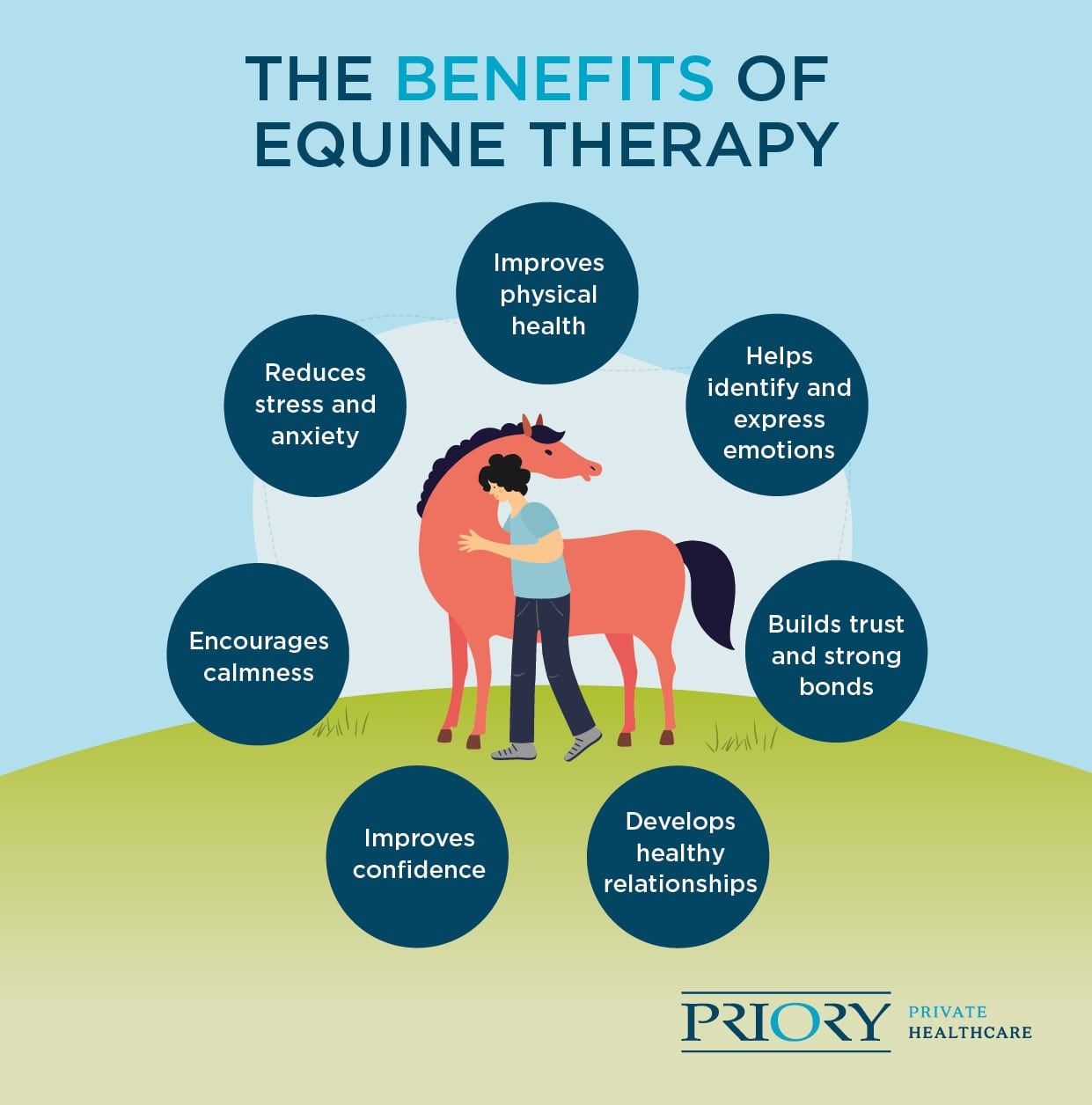Equine therapy
Find out about how horses can be used in therapy.
Caring for and interacting with animals has many proven health benefits. As it provides people with companionship, comfort and a strong sense of wellbeing, it’s no surprise that animals have been used for therapeutic purposes throughout history.
While a range of animals can be used in therapy, including dogs, cats, guinea pigs and even fish, equine therapy (therapy involving horses) has been found to be particularly effective in helping people to process and change negative behaviours.
Here, we explore equine assisted therapy in more detail, and discuss the benefits we see when using horses as part of addiction treatment at Priory.
At Priory, we’ve been using equine assisted therapy for many years. There’s a number of aspects to equine assisted therapy. First of all, it’s coming out into the beautiful environment and being with lovely animals. Other aspects of it are about controlling a one-tonne animal as a team. It enables patients to identify emotions which sometimes they find difficult to express inside groups. We’re very pleased with the results we’ve had from it.
Equine assisted therapy is a holistic, experiential and highly specialised form of therapy that involves working in collaboration with a horse, your therapist and an expert horse handler.
During sessions, you don’t actually ride the horse. Instead, you carry out tasks such as feeding, grooming and leading the horse. Sessions usually take place in small groups, where you may have specific tasks or ‘obstacles’ to overcome. After sessions, you have the chance to discuss your experiences and emotions with your therapist.
Ultimately, the aim of equine therapy is to help you discover more about yourself, develop new ways of thinking and change any negative behaviours.
Many of the benefits of equine therapy are likely due to the nature of the horses themselves. Horses are naturally gentle and calm creatures, and are able to mirror and respond to human behaviour, meaning they're highly effective at interacting and working with others in a patient and non-judgemental manner.
People who struggle to articulate how they’re feeling often find equine therapy useful as they’re able to express their emotions and feelings with their horse. In addition, people who find it hard to trust others or be intimate with people, can often achieve a strong bond and a level of closeness with their horse, and experience affection, acceptance and mutual respect.
Equine therapy doesn’t just result in psychological benefits - it has physical benefits too. Equine therapy has been found to reduce people’s blood pressure and heart rate, and help to calm physical symptoms of conditions such as anxiety and stress.

The big question that people have when they come here is what horses can actually give us in terms of psychotherapy. Horses are very social animals; they engage with each other, they engage with us. That whole process of exploring how can we connect to horses, what can we learn from them, what do they tell us about us, is the core of any equine assisted psychotherapy programme.
At Priory, we primarily use equine therapy to support addiction treatment. We are pleased to be able to offer this innovative therapeutic technique at a number of our Priory sites, including Priory Hospital Roehampton, Priory Hospital Woking and Priory Hospital North London, as a key element within our addiction treatment programmes.
At the beginning, your equine therapy sessions will focus on helping you overcome any initial uneasiness, empowering you to develop and nurture your relationship with the horse.
Working with horses needs patience, understanding, discipline and responsibility. Horses can be stubborn one day and playful the next, meaning that you need to be flexible, innovative and open to altering your behaviour.
By working through equine therapy, you can develop skills such as communication, self-control, problem solving and accountability, as well as improving your self-esteem, empathy, flexibility and independence.
It gives you the opportunity to discover more about your capabilities, develop new ways of thinking and change negative behaviours. For example, by working with the horse, you may start to notice self-defeating thought processes or negative patterns of behaviour which may be contributing to your addiction, giving you to opportunity to take steps to overcome them.